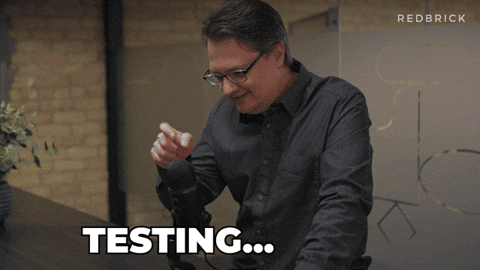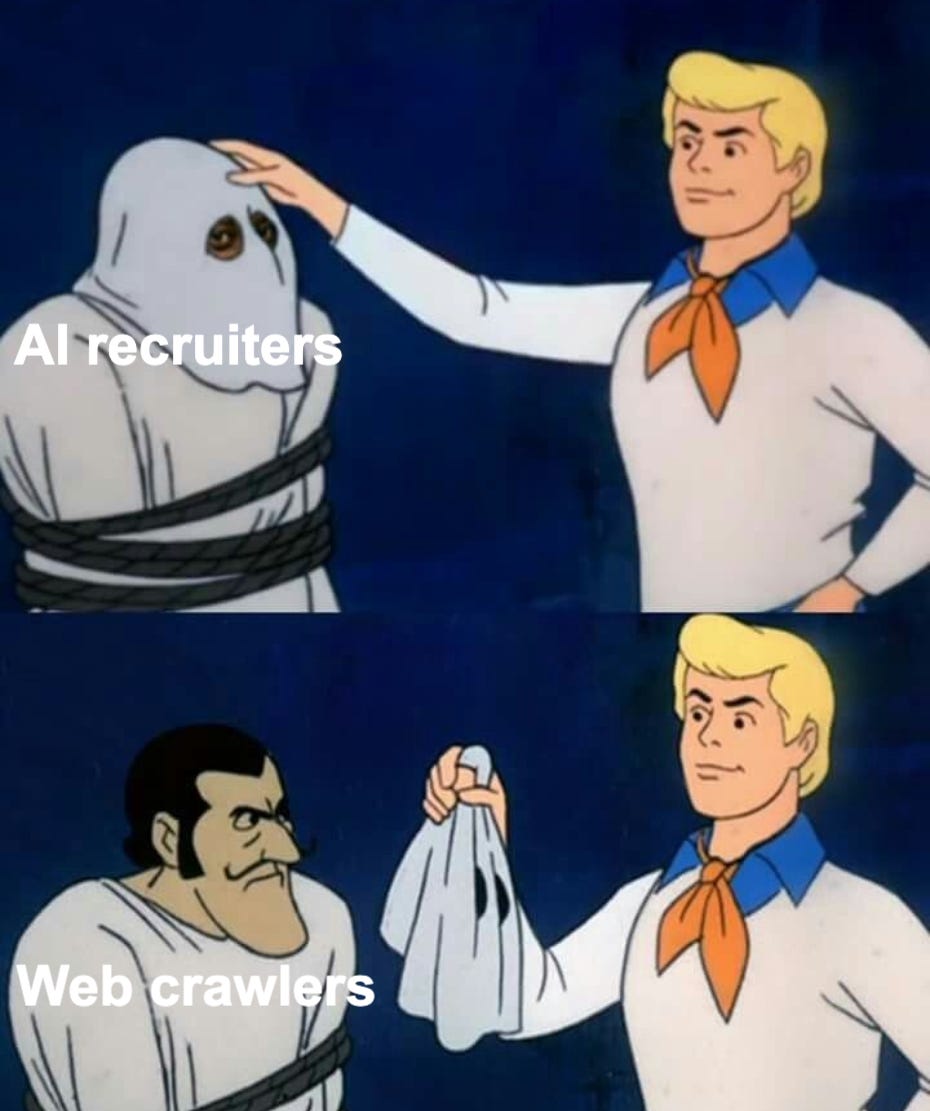A recruiter-turned-founder making AI work for humans, defending the human element
Can you defend the human element using AI? This founder believes you can.
If you’re short on time, read the 30 second version of this post.
A lot of the narrative at the moment revolves around a war between humans and AI, but what if there was a way to use AI to help humans tell their stories in a recruiting context? Masoud Ardestani set himself this challenge.
Our mission is to defend the human element using AI, which is hilarious. It's a kind of a paradox within itself.
Masoud Ardestani, Co-founder & CEO at Rapha
Masoud comes from a family of recruiters (wife and brother-in-law) and has been a recruiter himself. Contrary to most founders in the recruiting space, he's done the job and understands it deeply.
He hacked his way into a design job at Meta with an audio resume telling his story and context. He later used this "aha" moment to found Rapha, a recruiting platform built around the audio resume.
Throughout our conversation, his appreciation for stories and context became clear. Because of this, he has a deep concern for how companies are using AI to dehumanize the recruiting process, which often cuts out context and storytelling.
For employers, there are some great ways of automating a few areas in recruiting. But one thing that I feel like AI is hurting is the most essential part, which we're defending: the human side. Human interaction. We believe that AI will never make a hiring decision on your behalf.
The problem exists on both sides. While companies rush to automate, candidates struggle to stand out in an increasingly AI-driven process.
On the candidate's side, they're at their wit's end. They're trying to find ways to put their best foot forward, but unfortunately, they often end up auto-applying to 1000 jobs. Half the time, candidates don't know what they're applying for or have no context. These tools are hurting them in the long run.
We talk to Masoud about:
Rapha's origin story
AI and the future of recruiting
Founder tips for recruiting
How candidates can showcase value
If you’re short on time, check out Masoud’s Practical Tips ✨ below.
1. Rapha's story: from founding to today
Masoud's journey to founding Rapha started with his personal struggle to land a job. After closing his first company and having an upcoming engagement, he needed a job fast. Despite his entrepreneurial experience, he kept hitting walls with traditional applications.
"I thought to myself: If only you guys could hear how I got here," he recalls. This frustration led to his first experiment with audio resumes, allowing him to provide context about his journey that traditional resumes couldn't capture. The experiment worked – he landed a job at Meta.
Fast forward to today, and Rapha has evolved into what Masoud calls "the first contextual recruiting platform." Designed to capture culture fit, resilience, passion, and empathy without needing a phone screen. The thinking is that a hiring manager can specify upfront what they want to hear from candidates, which is what the candidates submit in an audio resume. In a sense, this is a new format which can often lead to non-obvious results:
Surprisingly, we find a lot of similarities between the questions a hiring manager at a Fortune 10 company has and a founder who just graduated from YC. Whether you're a huge company or a coffee shop, you likely want to know how a candidate would deal with demanding customers. Because those answers sit within Rapha, we believe we'll be able to help candidates position themselves for opportunities they might now have thought of themselves. We'll be able to identify your next opportunity faster and better than LinkedIn or indeed, because of the context we have.
Masoud strongly believes that candidates' stories are the most important part of the equation. We do think it's an important part of the story, but struggle to see how you'd use an audio resume to evaluate hard skills for an engineer, for example.
Your story is the resume, not how many green boxes you have filled on GitHub. A green box could be a huge feature or a typo you had to push out. It's not a good signal. The best way we've been seeing engineers get a job is by applying to jobs that use Rafa and explaining how they think. How they think about product, what good means to them, and how they handle difficult trade-offs. Being able to tell that story is what will get a candidate through the door rather than their GitHub.
Personally, we've not seen this work in practice, but given that it's a new format for job applications, we'll have to wait and see whether this is the way that companies hire engineers in the future.
Given his recruiting background and one of Rapha's benefits is making the recruitment process more efficient, we asked him about his thoughts on recruiters' roles with Rapha.
We just onboarded an in-house recruiter. Before Rapha, they used traditional applicant tracking systems. They'd do the traditional first call with the hiring manager: resume review, calibration, role description, etc. When sourcing sample profiles, it took them about two and a half weeks to ensure they were on the mark. When they found a good candidate, they'd schedule a manager call 2 weeks later. In the 1st 10 seconds of that call a hiring manager would evaluate if it was a good fit. Since using Rapha, they've been getting 60 hours a week back in their team's schedule. They have to specify what questions they want to filter for upfront. They've maintained a pass rate of over 50% and decreased spam applications by 98%. All of a sudden, the recruiter's job is focusing on quality rather than trying to boil the ocean. And the hiring manager is more involved and gives more insight versus being distant and only collaborating when things are falling apart.
These stats are impressive. One thing we're left wondering is: in the rush of finding a candidate, will a hiring manager take the time to listen deeply to each application, or will they revert back to listening for keywords (rather than reading them from a screen)?
Practical tips ✨
Front-load hiring manager feedback to reduce time-to-hire and improve candidate quality
Use specific, contextualized questions rather than generic screening questions
Consider ways to let candidates tell their story beyond traditional resume formats
2. AI and the future of recruiting
Masoud is skeptical of the current hype, particularly around AI recruiting agents.
You go to every AI recruiter product right now. Ask them to show you the dataset. Have you seen that meme of Scooby Doo where he takes the mask off? They are web crawlers—scrapers of Indeed, old resumes, and LinkedIn.
We agree with this view. Data is the least scalable aspect of AI and scrapers are being used to plug that data gap for candidates. Engineers still have to clean the data to ensure it will be useful for the models to allow them to learn the relevant recruiting activities. However, obtaining this clean input data from human recruiters in the correct format is tricky.
Founders can build their product's moat entirely around data. For Rapha, Masoud views a person's storytelling through audio as the moat itself. By front-loading all the information about a candidate's story to the beginning of the process, he believes that the initial phone screen, traditional resumes and cover letters will become obsolete. Our understanding here is that if the information density is high enough at the beginning of the process, you can make a decision faster. To either move candidates further down the funnel or to reject them earlier. However, there is information that can be captured from screening. How candidates react to probing questions and chemistry between the HM is still valuable information.
Masoud does not outright reject AI. He does see a place for it as a tool to empower our human qualities. It should allow us to tell our stories with a far greater depth than current formats. For instance, how a candidate would respond to a server going down on a Saturday night would be detected by Rapha's AI as having character and grit. The hiring manager would assess these traits through audio, using Rapha, to capture their semantic meanings. We think, however, that this will also have to be accompanied by a hard skills check. We'd find it difficult to assess a candidate thoroughly, purely through an audio resume.
Whenever I think of the word AI, it's a tool. Does that make me a payment company if I use Stripe? No. It's a tool that leads to a means, an end, and an outcome.
Practical tips ✨
Be skeptical of AI recruiting tools, audit their data sources
Look for ways to capture high-density information early in the process to make faster decisions
3. Founder tips for recruiting
With experience as a founder and a recruiter, we discuss his tips for founders currently recruiting. We also discussed his thoughts on red flags in candidate interviews, evaluating great recruiters and how being flexible has allowed him to find great candidates.
Red flags
If candidates are not responsive, it's usually a bad sign. Responsiveness needs to be matched by the recruiter, of course, but especially for candidates currently in the market, they should respond within a short window. Additionally, how do candidates treat your recruiters? How they handle someone they perceive to be less powerful than them is usually a good predictor of how they'll handle themselves when representing your company. Candidates who think they're above talking to recruiters or above the process, in general, are usually not great candidates
We've personally experienced the final one, too. Whether candidates refuse to speak to your recruiters or refuse to do assignments, if they think they're above the process, they're usually going to be difficult to work with.
His tips on evaluating recruiters
A great recruiter gives candidates hope. They are their biggest supporters. I love prepping people up and boosting their confidence. These are big moments, so being a supporter, being present, having good communication, being available, and being at their service goes a long way.
From a non-recruiter's perspective, we see many recruiters getting a bad rep, but the reality is they're not all the same. A terrible recruiter might simply be keyword-matching. A great recruiter comes equipped with a great network, deep specialization, and a lot of empathy.
A recruiter we worked with years ago at Prolific, Judy Haley, is the example I always point to. Aside from her hard skills and specialization, the feedback about her from candidates, especially her empathy, always blew us away. Empathy can go a very long way in giving companies an edge when battling it out for talent.
Being flexible when evaluating candidates
A person I recruited for an engineering role was a dental hygienist. They'd been doing boot camps, which was slightly looked down upon back then. But rather than discard him, I used my technical and product knowledge to talk with him and suggest he put his hat in the race for a role he thought was above him. I took a bet on him, and lo and behold, he got the job.
Stories like this are surprisingly common, as long as the person on the hiring end has an open mind. We've seen the benefits of not discarding candidates based on the "pedigree" on their resume: career switchers, people with interesting side projects, and candidates who show a certain fire and passion in an application. These have all led to great hires that we’re still proud of today.
Practical tips ✨
Watch how candidates treat everyone in the process, not just hiring managers
When evaluating recruiters look for specialisation, network and deep empathy
Stay open to non-traditional backgrounds, especially when candidates show passion and drive
4. How candidates can showcase value
“Demonstrate your value to the company not just through hard skills but through your character. It's that simple”, says Masoud.
If candidates provide value, they will get hired, regardless of the prompt or the technology they use. If candidates are technically unqualified but show character and provide value, they will still stand a chance.
In a world where AI tools make it easy to mass-apply, Masoud emphasizes the importance of authentic storytelling and demonstrating real value. Going back to the dental hygienist story, although the person was a novice, their character convinced Masoud that they would be a great candidate. Github output was not a factor because he assumed this was an intelligent candidate with a burning desire to improve their engineering chops.
From our experience, stale GitHubs are all too common, and it can be very difficult to derive genuine signals from candidates. It is also possible candidates have cloned and copied code. With that said, you really should do a deep technical check depending on the role. If it's for entry-level, then sure, the character may outweigh the technical need, but for more senior roles at smaller companies, you really should go deeper.
Your story is the resume, not how many green boxes you have filled on your GitHub.
For entry-level candidates, Masoud advises building. Build anything and get your hands dirty. This way, candidates can demonstrate tangible outputs to prospective employers. It allows them to showcase how you have made design decisions and trade-offs.
Beyond projects, we believe that candidates should provide context about their personal journey. The context will help the hiring manager understand whether candidates are a cultural fit. Candidates are hurting themselves if they do not showcase themselves and lazily use ChatGPT. Hiring managers can easily tell when candidates have done this.
Practical tips ✨
Candidates can demonstrate value through real projects
For entry-level positions, candidates should show initiative through side projects and hands-on experience
Conclusion
There are elements of a candidate that are extremely difficult to express through a resume. Character and determination are difficult to assess but essential to a good match.
Masoud's approach with Rapha aims to capture those more human elements through async audio communication. Capturing the human story in this fashion should provide a more efficient method of determining cultural fit.
AI's rush to automate is sacrificing candidates who lie outside a neat distribution where an employer can tick every box. This will exacerbate inequality, as those outliers will simply be unable to do the keyword matching that their more privileged peers can rely on.
What we like about Rapha's approach is that it allows candidates who might not be the best on paper, a fighting chance. Startups don't always have the luxury of getting candidates with the most prestigious backgrounds, so having a way of finding "diamonds in the rough" that can grow with your company is crucial.
We do think technical skills are necessary, though, so you will need to find a balance between assessing a candidate's story and gauging whether there are enough technical merits to warrant taking a bet on them. We're keen to find these new solutions that—like Rapha—are rethinking how employers can find a better match more humanly and efficiently.





